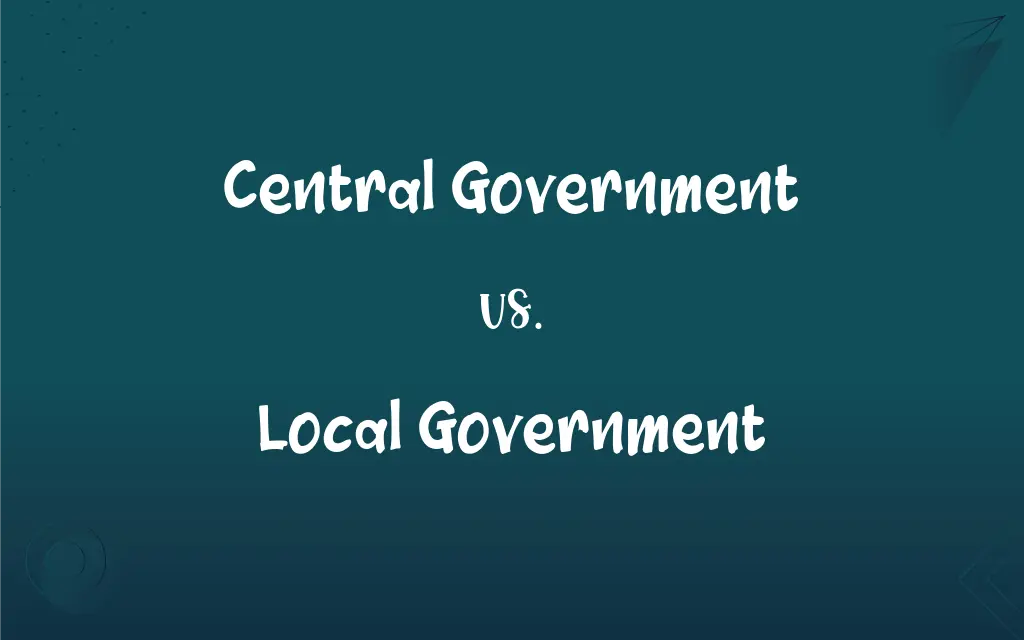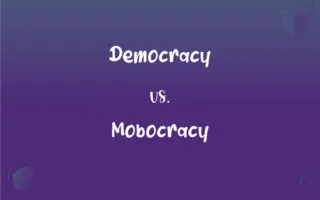Central Government vs. Local Government: What's the Difference?
Edited by Janet White || By Harlon Moss || Updated on October 5, 2023
Central government administers an entire nation, while local government manages specific municipalities, cities, or regions, each with its distinct responsibilities and powers.

Key Differences
Central government typically refers to the governmental structure that governs the entirety of a nation or state. It devises policies, regulations, and directives that are usually applicable across all regions and administrative divisions of the country. Conversely, local government pertains to administrative control over a smaller geographic region, such as a city, town, or district, focusing on local issues and needs with its governance.
While the central government is responsible for national defense, foreign policy, and macroeconomic management, local government generally oversees community services like waste management, local road maintenance, and public recreation areas. The breadth and depth of influence, therefore, diverge significantly between the two entities.
Central government usually has the power to impose laws, collect taxes, and make decisions that impact the country as a whole. Local government, although it may impose local taxes and pass local ordinances, usually has authority confined to more specific, regional matters, ensuring the local community's needs and preferences are addressed.
Fiscal allocation and management further distinguish central government from local government. Central entities determine national budget allocations, ensuring the distribution of financial resources among all regions. In contrast, local governments manage and allocate their budgets to cater to the localized needs, maintaining community facilities and infrastructures.
When we talk about legal jurisdictions, the central government holds the authority to enact laws that are generally applicable nationwide, overseeing national justice, and regulatory compliance. Whereas local government typically enforces and manages local ordinances, ensuring that they align with broader, centralized legal frameworks but are tailored to the local context.
ADVERTISEMENT
Comparison Chart
Scope
Nationwide, overarching governance
City, town, or district-level governance
Responsibilities
National defense, foreign policy, federal laws, etc.
Local infrastructure, community services, etc.
Authority
Enacts and enforces laws across the entire nation
Implements and manages local policies and ordinances
Budget Management
Allocates and manages the national budget
Manages and allocates local budgets
Legal Jurisdiction
Nationwide legal and regulatory authority
Limited to local ordinances and regulations
ADVERTISEMENT
Central Government and Local Government Definitions
Central Government
Central government orchestrates international relations, determining foreign policy and diplomatic interactions.
The central government negotiated a new trade agreement with the neighboring country.
Local Government
Local government often handles the administration of local educational institutions, libraries, and recreational areas.
The local government allocated funds for the renovation of the public library.
Central Government
It carries the responsibility for deploying and maintaining the national defense and military forces.
The central government decided to increase the defense budget to enhance military capabilities.
Local Government
It typically oversees local zoning, managing the permissible uses of land within its jurisdiction.
The local government approved the zoning application for the construction of a new shopping mall.
Central Government
It oversees the development and management of nationwide infrastructure projects, such as highways and railways.
The central government announced the inauguration of a transnational highway project next month.
Local Government
Local government addresses local residents' concerns, offering a platform for community voices and preferences in governance.
The local government revised the school district policies after parents voiced their concerns.
Central Government
The central government maintains authority over an entire nation, administering national policies and laws.
The central government implemented a new economic policy to tackle nationwide inflation.
Local Government
It is tasked with managing community-specific services like local road maintenance, sanitation, and local police departments.
The local government initiated a program to enhance waste recycling within the community.
Central Government
Central government plays a pivotal role in devising and implementing national fiscal and monetary policies.
During the recession, the central government introduced a stimulus package to revive the economy.
Local Government
Local government operates within a specific locality, addressing the unique needs and administration of that area.
The local government organized a town hall meeting to discuss the new park development.
FAQs
What is the primary role of the central government?
The central government oversees national affairs, such as crafting federal laws, managing foreign relations, and ensuring nationwide security.
Can local governments enact their own laws?
Yes, local governments can create and enforce local ordinances, provided they do not conflict with central government laws.
How does local government funding typically work?
Local governments usually derive funding from local taxes, federal allocations, and sometimes, grants or subsidies from the central government.
Can the central government intervene in local government matters?
Yes, the central government can intervene in certain scenarios, especially if local actions conflict with national laws or interests.
Can local government establish its own police department?
Yes, local governments often establish and manage their own local police departments to maintain order within their jurisdiction.
How do central and local governments work together during national emergencies?
Central and local governments collaborate to coordinate resources, implement emergency responses, and ensure efficient communication and relief efforts during national emergencies.
How does central government ensure equal development across all regions?
Central governments allocate budgets and implement policies to ensure resources and developmental efforts are distributed equitably across all regions.
What’s an example of a service typically managed by local government?
Services like waste management, local road maintenance, and public libraries are typically managed by local government.
Who makes decisions regarding foreign policy and international relations?
The central government is responsible for crafting and implementing foreign policy and managing international relations.
How does local government address community issues?
Local government manages community-specific matters like local infrastructure, public services, and implementing policies that cater to the area's unique needs.
What is an example of a responsibility unique to the central government?
Managing the nation’s military and defense strategies is a responsibility unique to the central government.
How do local governments support local businesses?
Local governments can support businesses through local policies, grants, resources, and maintaining infrastructure that facilitates business operations.
What kind of public services is the local government responsible for?
Local government is typically responsible for public services like emergency services, recreational parks, and public transport within their jurisdiction.
Can local government decisions be overridden by the central government?
Depending on the country's legal structure, central government can override local decisions, especially if they conflict with national laws or interests.
How are central government officials typically selected?
Central government officials are usually elected through nationwide elections or appointed, depending on the country's political structure.
How does the central government contribute to national economic stability?
The central government manages macroeconomic policies, regulates national fiscal matters, and introduces economic interventions when necessary.
What role does local government play in education?
Local governments usually manage and fund local schools, oversee educational services, and implement policies tailored to their community’s educational needs.
Are central and local governments subject to the same legal constraints?
Not always. Central government operates under federal laws, while local governments must adhere to both federal and their specific local legal frameworks.
How do central and local governments manage public health?
While the central government may establish overarching health policies, local governments manage community-specific health services and implement these policies at the local level.
What is the scope of power of local government in policymaking?
Local government can create and implement policies within its jurisdiction as long as they align with national laws and constitutional provisions.
About Author
Written by
Harlon MossHarlon is a seasoned quality moderator and accomplished content writer for Difference Wiki. An alumnus of the prestigious University of California, he earned his degree in Computer Science. Leveraging his academic background, Harlon brings a meticulous and informed perspective to his work, ensuring content accuracy and excellence.
Edited by
Janet WhiteJanet White has been an esteemed writer and blogger for Difference Wiki. Holding a Master's degree in Science and Medical Journalism from the prestigious Boston University, she has consistently demonstrated her expertise and passion for her field. When she's not immersed in her work, Janet relishes her time exercising, delving into a good book, and cherishing moments with friends and family.































































